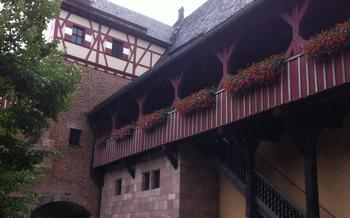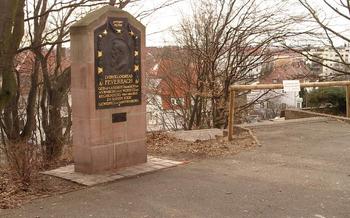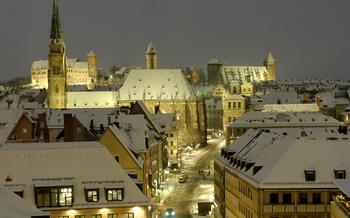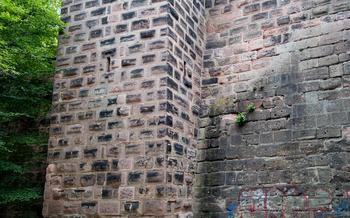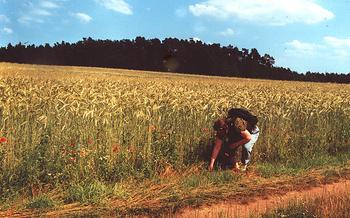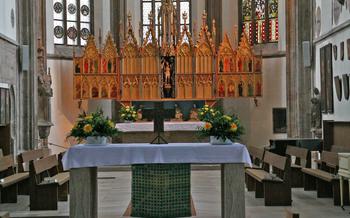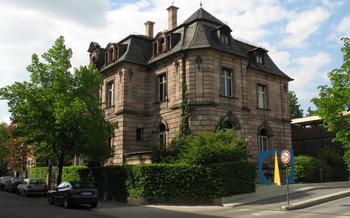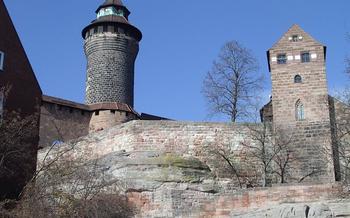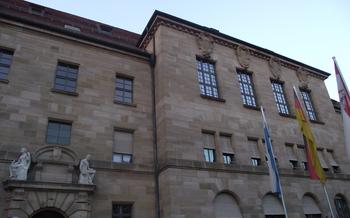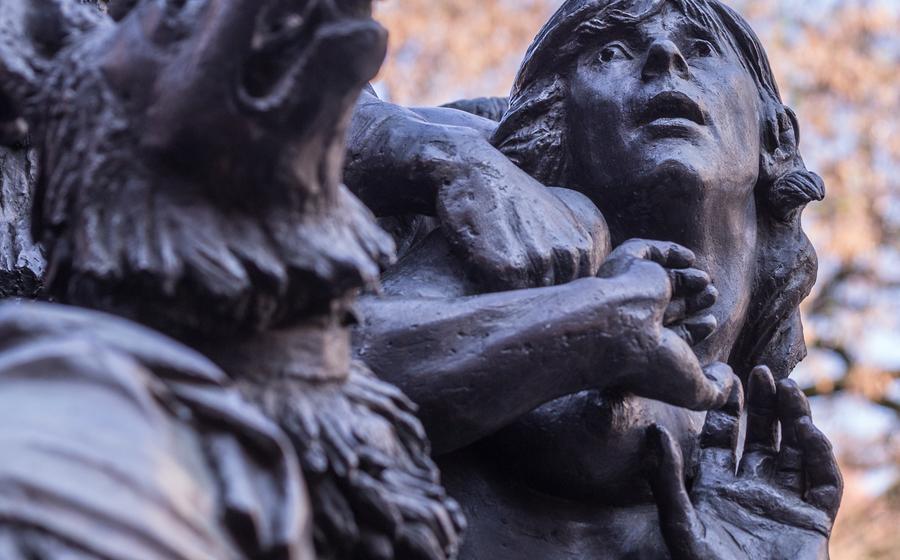
Dokumentationszentrum Reichsparteitagsgelände (Documentation Centre Nazi Party Rally Grounds)
- Guided Tours
- Research and Documentation
- Memorial and Remembrance
- Controversies and Criticism
- Visitor Etiquette and Guidelines
- Accessibility for Children and Families
- Local Recommendations
- Online Resources and Virtual Tours
- Insider Tip
Guided Tours
Enrich your visit to the Dokumentationszentrum Reichsparteitagsgelände by opting for a guided tour. Conducted in various languages, these tours offer an in-depth exploration of the site's history and significance. Experienced guides provide insightful commentary, allowing you to grasp the complexities of the Nazi Party's rise and fall.
Guided tours typically last for about 90 minutes and cover the key areas of the rally grounds, including the Grandstand, Congress Hall, and the Documentation Center's permanent exhibition. They delve into the propaganda techniques employed by the Nazis, the role of Nuremberg in their ideology, and the impact of the Nuremberg Trials.
Booking a guided tour is recommended for a deeper understanding of the site's historical context and symbolism. Tours can be booked online or at the Documentation Center's ticket counter. Fees vary depending on the group size and language preference.
Whether you're a history buff, a student, or simply seeking a profound cultural experience, a guided tour at the Dokumentationszentrum Reichsparteitagsgelände is an invaluable addition to your visit.
Research and Documentation
The Dokumentationszentrum Reichsparteitagsgelände is not just a museum; it is also a hub for research and documentation on the history of the Nazi Party and the Nuremberg Trials. The center houses an extensive archive with over 100,000 documents, including original speeches, propaganda materials, and trial transcripts. There is also a library with over 25,000 books and journals on Nazi history and the Holocaust. Researchers from around the world come to the center to access these valuable resources.
The documentation center also offers a variety of research and educational programs. These programs are designed to promote understanding and tolerance, and to help prevent future genocides. The center works closely with schools and universities to develop educational materials and programs that can be used in the classroom. The center also offers workshops and seminars for teachers and other educators.
If you are interested in learning more about the history of the Nazi Party and the Nuremberg Trials, the Dokumentationszentrum Reichsparteitagsgelände is a must-visit. The center's extensive research facilities and educational programs make it a valuable resource for researchers, students, and anyone interested in this dark chapter of history.
To access research materials or inquire about research opportunities, please contact the center's research department. The staff is friendly and helpful and can assist you with your research needs.
Memorial and Remembrance
The Dokumentationszentrum Reichsparteitagsgelände serves as a poignant memorial and remembrance site, honoring the victims of Nazi atrocities and preserving their memory. The center's exhibitions pay tribute to those who suffered under the Nazi regime, highlighting individual stories and experiences. Visitors can learn about the lives of those persecuted and murdered, gain insights into their struggles, and reflect on the horrors of the Holocaust.
The documentation center also hosts memorial events, ceremonies, and commemorations throughout the year. These events provide opportunities for visitors to come together, remember the victims, and reaffirm their commitment to fighting against intolerance and discrimination. By preserving and honoring the memory of those who suffered, the center plays a vital role in promoting reconciliation and fostering a culture of remembrance and understanding.
Visitors to the documentation center can pay their respects in various ways. They can light a candle in the memorial hall, lay flowers at the foot of the commemorative sculptures, or simply take a moment of silence to reflect on the atrocities that occurred. The center also offers guided tours that focus specifically on the history of the Nazi Party and its impact on the lives of its victims. These tours provide a deeper understanding of the events that unfolded in Nuremberg and the profound suffering that resulted from them.
Controversies and Criticism
The Dokumentationszentrum Reichsparteitagsgelände has faced its share of controversies and criticisms over the years. Some critics have argued that the center presents a one-sided view of history, focusing primarily on the atrocities of the Nazi regime and neglecting the broader context of German history. Others have questioned the accuracy of certain exhibits and accused the center of sensationalism.
In response to these criticisms, the center has made efforts to address concerns and improve its representation of history. It has expanded its exhibitions to include more information on the rise of Nazism and the impact of the Nuremberg Trials. The center has also worked to ensure that all exhibits are based on sound historical research and presented in a balanced and objective manner.
Despite these efforts, the center continues to be a subject of debate and discussion. Some argue that it is essential to confront the dark chapters of history, even if it is uncomfortable or controversial. Others believe that the center should focus more on reconciliation and healing rather than on dwelling on the past.
The ongoing dialogue surrounding the Dokumentationszentrum Reichsparteitagsgelände highlights the importance of fostering open and critical engagement with history. By examining the past, we can learn from our mistakes and work towards a better future.
Visitor Etiquette and Guidelines
When visiting the Dokumentationszentrum Reichsparteitagsgelände, it is important to be mindful of the somber and respectful atmosphere of the site. Visitors are encouraged to maintain silence and refrain from loud conversations or disruptive behavior in areas dedicated to remembrance and reflection. Photography and recording devices are permitted, but it is essential to be considerate of other visitors and the solemnity of the site. The documentation center provides various visitor services, including lockers for storing personal belongings, restrooms, and a dining area for refreshments. These services ensure a comfortable and informative visit for all guests.
Accessibility for Children and Families
The Dokumentationszentrum Reichsparteitagsgelände is suitable for families with children, but it's essential to consider the sensitive nature of the topics covered. The center offers a range of educational programs and resources tailored for younger visitors, including interactive exhibits, guided tours, and workshops. These programs aim to provide age-appropriate explanations and discussions about the history of the Nazi Party and its impact.
Parents or guardians should be prepared to answer questions and provide context to help children understand the complex topics presented. It's important to emphasize the importance of tolerance, understanding, and respect for all people, regardless of their race, religion, or background.
By fostering open dialogue and encouraging critical thinking, the documentation center provides a valuable opportunity for children and families to learn about the past and its relevance to the present day.
Local Recommendations
In addition to the Dokumentationzentrum Reichsparteitagsgelände, Nuremberg offers a wealth of historical and cultural attractions that shed light on its rich past. Immerse yourself in the city's medieval heritage at the Imperial Castle, which boasts stunning views and intriguing museums. Explore the Albrecht Dürer House, where the renowned Renaissance artist lived and worked, gaining insights into his creative genius. For a glimpse into Nuremberg's industrial legacy, visit the Germanisches Nationalmuseum, which houses an extensive collection of artifacts and exhibits showcasing the city's contributions to science, technology, and art.
To savor the local flavors, head to one of the many traditional Franconian restaurants, where you can indulge in culinary delights such as Schäufele (roast pork shoulder) and Nürnberger Rostbratwürste (grilled Nuremberg sausages). For a sweet treat, try the Lebkuchen, a gingerbread specialty that has been a Nuremberg tradition for centuries.
To enhance your understanding of Nuremberg's history, consider joining a guided walking tour. These tours often delve into the city's dark past, shedding light on its role during the Nazi era and the Nuremberg Trials. Alternatively, hop on the Nuremberg Hop-On Hop-Off Bus, which provides a convenient way to explore the city's landmarks and attractions at your own pace.
Plan a comprehensive itinerary that allows you to experience the diverse facets of Nuremberg. Dedicate a day to exploring the documentation center and other historical sites related to the Nazi era. On another day, immerse yourself in the city's medieval charm and visit the Imperial Castle and Albrecht Dürer House. Don't forget to allocate time for culinary adventures, sampling local delicacies and savoring the unique atmosphere of Nuremberg's restaurants and cafes.
Online Resources and Virtual Tours
For those unable to visit the Dokumentationzentrum Reichsparteitagsgelände in person, there are a wealth of online resources and virtual tours available to explore the site and its history. These virtual experiences offer a unique opportunity for education and accessibility, allowing visitors from around the world to delve into the past and gain insights into the Nazi Party Rally Grounds.
The documentation center's website provides a comprehensive range of online exhibitions, interactive features, and historical information. Visitors can explore virtual galleries showcasing artifacts, documents, and propaganda materials related to the Nazi Party and its rallies in Nuremberg. These online exhibitions offer a rich visual and interactive experience, allowing users to zoom in on details, read transcripts, and learn more about the historical context.
In addition to the website, the documentation center also offers virtual tours that provide a guided experience through the Gelände. These tours are led by experienced educators who share insights into the history of the site, its architecture, and its significance. Visitors can navigate through 3D models of the Gelände, explore key locations, and listen to audio commentary that brings the past to life.
Whether you are a student, researcher, or simply someone interested in history, the online resources and virtual tours offered by the Dokumentationzentrum Reichsparteitagsgelände provide a valuable opportunity to learn about this dark chapter in history from the comfort of your own home.
Insider Tip
In the heart of the documentation center, take a moment to stand in front of the "Field of Stones," a haunting memorial to the Jewish victims of the Holocaust. This poignant display of 1,500 concrete pillars, each representing a destroyed Jewish community, will leave an enduring impression. As you stand among these silent witnesses, let the weight of history envelop you and reflect on the profound loss and suffering endured. This deeply moving memorial serves as a powerful reminder of the fragility of human life and the importance of remembrance.
